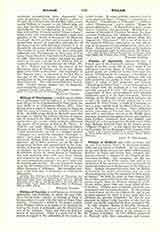

William of Conches, a twelfth-century Scholastic philosopher and theologian, b. about the year 1100. After having been a teacher of theology in Paris he became? about the year 1122, the tutor of Henry Plantagenet. Warned by a friend of the danger implied in his Platonic realism as he applied it to theology, he took up the study of philosophy and the physical science of the Arabians. When and where he died is a matter of uncertainty. There is a good deal of discussion in regard to the authorship of the works as-cribed to him. It seems probable, however, that he wrote glosses on Plato’s “Timaeus”, a commentary on Boethius’s “Consolations of Philosophy“, a dialogue called “Dragmaticon”, and a treatise, “Magna de naturis philosophia”. William devoted much attention to cosmology and psychology. Having been a student of Bernard of Chartres, he shows the characteristic Humanism, the tendency towards Platonism, and the taste for natural science which distinguish the “Chartrains”. He is one of the first of the medieval Christian philosophers to take advantage of the physical and physiological lore of the Arabians. He had access to the writings of the Arabians in the translations made by Constantine the African.
WILLIAM TURNER

